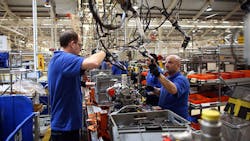UK Manufacturing Grows as Firms Step Up Brexit Preparation
U.K. manufacturing growth unexpectedly improved to a six-month high in December, as companies built up inventories and boosted new orders in preparation for a potentially disruptive Brexit.
IHS Markit’s Purchasing Managers Index for the industry rose to 54.2 last month, more than the 52.5 expected by economists. Still, the average reading for the final three months of the year was the lowest since the third quarter of 2016, the firm said.
The U.K. is set to leave the European Union at the end of March, and Britain’s ability to agree on an exit deal before the deadline is still uncertain.
In December, the U.K. government stepped up preparations for a no-deal withdrawal, including asking pharmaceutical companies and supermarkets to stockpile drugs and food, and putting 3,500 troops on standby.
Key Insights
The rise, from 53.6 in November, was driven by a near-record increase in stock holdings and a strong inflow of new orders, both of which “reflected Brexit preparations by manufacturers and their clients” Markit said.
The “positive impact on the PMI is likely to be short- lived,” according to Rob Dobson, director at IHS Markit, with near-term gains likely to be “reversed later in 2019 when safety stocks are eroded or become obsolete.”
New export orders increased after declines in October and November, with the ongoing weakness of sterling and Brexit planning contributing to overseas sales growth.
Output growth dipped slightly in December to among the weakest registered in the last two and a half years.
Manufacturers’ confidence levels are only slightly above the 27-month low in November, with firms citing Brexit and exchange-rate uncertainty as a weight on the outlook.
Markit is due to publish similar indexes for the U.K.’s construction and dominant services sector this week. The Bank of England kept interest rates on hold in December, with policy makers saying that Brexit worries have “intensified considerably.”
By Jill Ward
About the Author
Bloomberg
Licensed content from Bloomberg, copyright 2016.
